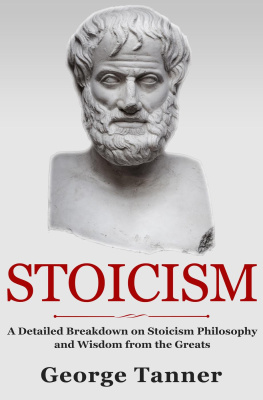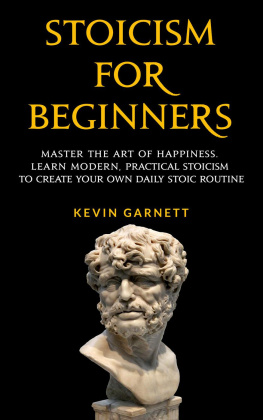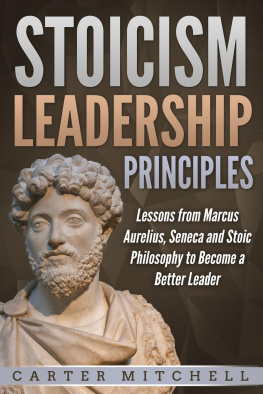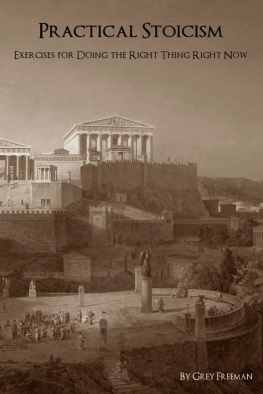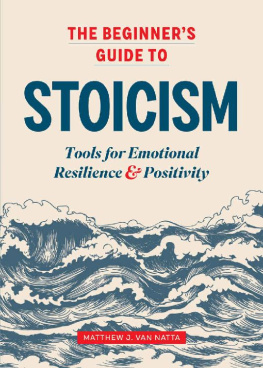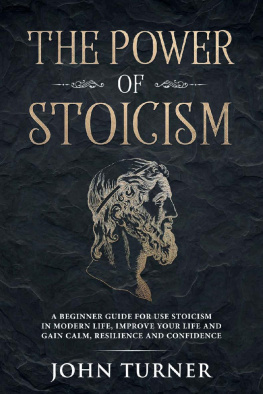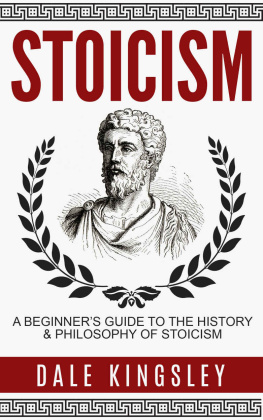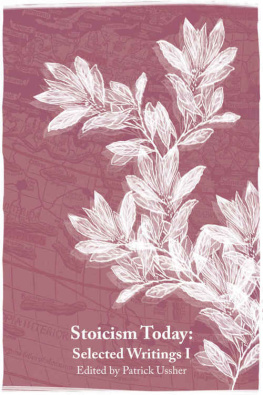STOICISM
The modern look at the stoicism philosophy. The guide to overcoming obstacles in life, developing mental toughness, and changing your life
By G.S. BAKER
Copyright 2020 by G.S. BAKER
All rights reserved.
This document is geared towards providing exact and reliable information with regard to the topic and issue covered. The publication is sold with the idea that the publisher is not required to render accounting, officially permitted or otherwise qualified services. If advice is necessary, legal or professional, a practiced individual in the profession should be ordered.
From a Declaration of Principles which was accepted and approved equally by a Committee of the American Bar Association and a Committee of Publishers and Associations.
In no way is it legal to reproduce, duplicate, or transmit any part of this document in either electronic means or in printed format. Recording of this publication is strictly prohibited, and any storage of this document is not allowed unless with written permission from the publisher. All rights reserved.
The information provided herein is stated to be truthful and consistent, in that any liability, in terms of inattention or otherwise, by any usage or abuse of any policies, processes, or directions contained within is the solitary and utter responsibility of the recipient reader. Under no circumstances will any legal responsibility or blame be held against the publisher for any reparation, damages, or monetary loss due to the information herein, either directly or indirectly.
Contents
INTRODUCTION
S toicism is an old Greek way of thinking (created by Zeno of Citium around 300 BC as a refinement of criticism) that teaches the development of self-control and firmness as a means of overcoming destructive emotions. It is not a question of completely erasing emotions but of transforming them through a certain asceticism (voluntary abstinence from worldly pleasures), which allows a person to develop clear judgment, inner peace, and freedom from suffering (which he considers the primary objective).
Stoicism is not only a set of ethical beliefs or affirmations, and it is a lifestyle that includes constant practice and training and which aims to form the practice of logic, Socratic dialogue and personal dialogue, contemplation of death, and some form of meditation. To stay in the present moment.
The term "stoic" derives from the "stoa poikile" (meaning "painted veranda" or "colonnade") in which Zeno taught from Citium. In modern language, the word refers to someone who is neither emotional nor indifferent to pain, pleasure, pain, or joy and has little in common with his philosophical roots.
Stoic Ethics
As moral teaching, the objective of Stoicism is an opportunity from enthusiasm (in the old feeling of "dread" or "enduring") looking for a reason and "Apatheia" (apathy in its old mind, objective, emotionless and with a judgment clear). It teaches indifference and a "passive" response to external events (based on the fact that nothing outside can be neither good nor bad) and patience in the ups and downs of life.
The Stoics have taught that as a clear, impartial, and self-disciplined thinker, one can understand "logos" (the universal natural reason in all things). So misfortune and wickedness are the consequence of numbness. If somebody is inconsiderate, it is because they don't know about their comprehensive explanation. The solution to this wickedness and unhappiness can be achieved through the practice of Stoic philosophy (by examining one's judgments and behaviors to determine where they may have diverged from the universal foundation of nature). Hence the famous Stoic maxim: "Living according to nature," both in the sense of the laws of the universe and of the nature of man, reason.
In many ways, he is incredibly attracted to Siddhartha Gautama's theology. (c. 563-483 BC) and Buddhism, which depends on the four honorable realities: 1) all life has enduring; 2) Suffering is established in enthusiasm and want; 3) Happiness is the opportunity from interests; 4) Moral moderation and self-discipline are how we become free from suffering.
An essential aspect of stoicism is to improve the ethical and moral well-being of individuals by having a will that is in harmony with nature and practicing the four cardinal virtues (derived from Plato's teachings): wisdom ("Sophia"), Courage ("Andreia "), justice (" dikaiosyne ") and moderation (" sophrosyne ").
For the Stoics, living as indicated by reason and ideals implies living incongruity with the first request of the universe and perceiving the regular explanation and essential estimation surprisingly. Along these lines, they advanced populism and, bizarrely for their time, they improved the acknowledgment of equivalent slaves as reciprocals on the premise that all were "offspring of God" and repeated Socrates' case that "I am not an Athenian or a Greek but rather a resident the world. " They also contested the importance of external differences such as rank and wealth in social relationships.
To some extent, stoicism starts from determinism by saying that we will do it according to the needs of the world but says that not only do we obey the law, but we accept our obedience and should follow the law knowingly and deliberately as only a reasonable being can do.
The Roman philosopher and stoic Seneca the Younger (4 BC - 65 BC) From the 1st century AD, the most famous and popular philosopher of his time, the topic of anger took the issue quite seriously. He considered violence a philosophical problem that can be treated with rational arguments, not just an irrational hotbed over which we have no control. He felt that anger was caused by overly optimistic ideas about the world, which led to unrealistic expectations and recommended a more pessimistic attitude to prepare for the kind of bad things that happen mentally and therefore not lead to such outbursts of anger would do.
Other Principles
Stoic logic and epistemology affirm the certainty of knowledge that can be achieved through the use of reason and by controlling the conviction with peer experience and the collective judgment of humanity. The senses must regularly receive sensations in the form of pulsations that reach the mind from objects through the senses and leave an impression there. The mind can approve or reject an impact to distinguish a representation of reality from a false image. This theory is, therefore, in direct contrast to Plato's idealism, for which only the mind was the source of knowledge and the senses the source of all illusions and errors.
In comparisons, students of faith believe in a material world but a rational thing that can be called God or nature and which is divided into two classes, passive (critical matter) and active (in many such as fate or descriptions of which), an instrument, ether intelligence or primitive fire, which works on passive thing). Human and animal spirits are examples of this primitive fire and are also subject to destiny. Heraclitus captures the idea that everything is fire and also has a long view of history in which the world is once again burned and will become backfire.
For Stoic students, everything is material, and there is nothing more than materialism. The words and God Himself are material; Emotions are substantial because they have physical manifestations (for example, blushing, smiling); the mind or soul is reduced to matter because the body evokes thoughts or sensations in the soul and the soul evokes movements in the body that would be impossible if the body and soul did not have the same substance.
The Stoics also believed that the whole world was one and had a principle (monism) and that a divine reality pervades the entire universe (pantheism). So the universe is like a vast living body, with its central part (the stars or the sun), but all the components are interconnected so that what happens in one place influences what happens in another place. Everything in the World is predestined (destined), though man has a specific free will (just as vortices play in the stream of all rivers).



